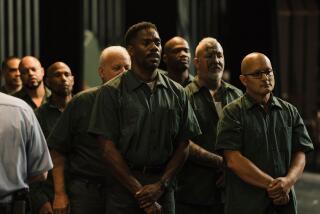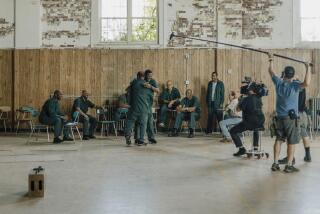Gang Story Pins Hope on the Family : Theater: Jaime Gomez’s ‘Smile Now, Cry Later,’ a three-act musical drama, premieres tonight at Fullerton College.
FULLERTON — The gang problem has baffled social scientists and police for years as they’ve wondered whether there’s a solution. And, like others, playwright Jaime Gomez of Fullerton is more apt to shrug in frustration than to offer concrete answers. But Gomez, who since 1985 has run a shelter for the homeless while writing and acting for Latino theater groups, believes that there is a starting point for hope--the family.
“It may be a little obvious, but the family is crucial. It’s where it all begins,” said Gomez, 35. “Families need to become more together and be there for the kids. There has to be a foundation that they can return to when faced with gangs.
“If they don’t have a home to learn the right things in, they look elsewhere. Too often, a gang can become a family for kids who are searching or are facing things, like poverty and peer pressure.”
With this as the focus, Gomez wrote “Smile Now, Cry Later” for Teatro Cometa, an Orange County drama troupe that deals primarily with minority issues, especially those affecting the Latino community.
The three-act musical drama premieres tonight at Fullerton College’s Wilshire Theatre and continues Saturday, after which Gomez plans to take it on tour to local schools and other venues throughout the Southland.
Gomez describes “Smile Now, Cry Later” as a slice-of-life piece, not based on any specific incidents he has encountered but representing a pastiche of inner-city problems. He said, however, that his experiences operating the New Vista Shelter for Homeless Families in Fullerton gave him insight into the troubles youngsters have when a stable home life is missing.
The play’s plotting is straightforward: Two families are represented, with young Latinos from both becoming attracted to local gangs. After they join, there’s a street killing. The victim’s gang pledges revenge, and the tragedy escalates. The setting could be East Los Angeles, or it could be Santa Ana. Gomez said he didn’t want to be specific because the dilemma is so widespread.
“These types of things are happening everywhere, even in Orange County,” he said. “Anybody who doesn’t think that is fooling themselves.”
The families’ reactions form the core of the play, and Gomez hopes that it will inspire people to reflect on how they respond to their own children and what they would do if faced with a similar situation.
“I think it makes a few good points (about) how poverty and peer pressure and the glorification of gangs make them look good to young people,” he said. “But I really want the audience to to see it and re-evaluate their relationship with their kids and their families in general. They should also look at themselves and question what it is that their family needs to stay together.”
Gomez said two things worried him while writing “Smile Now, Cry Later.” He wanted to avoid sensationalizing gang activity and to instruct without being preachy. “What’s so hard is giving your point of view while not giving everybody a lecture.”
Along with trying to avoid the soapbox, Gomez said, he has attempted to make the piece as entertaining as possible within its serious framework. The play includes a few dance numbers performed by the 23-member cast and a handful of “street-style” songs indigenous to the culture.
“We wanted to give a feel for the streets, (and) all the original music is funky, the driving force of the streets,” he said. “We also have some ballads and plenty of choreography that has a street flavor.”
As with most Teatro Cometa productions (over the years, they’ve dealt with migrant workers, amnesty rights and the importance of the census for minorities, among other topics), “Smile Now, Cry Later” is a collaborative effort utilizing people from the community. Youngsters from local junior high and high schools are part of the cast, and Gomez has brought in a team of Latino artists to help with the staging and choreography. Among them is Emigdio Chavez Vasquez, a noted local muralist who designed the play’s set.
It’s likely that work will continue on the play in the coming months, said Gomez, noting that he would like to trim the length of the piece somewhat and eventually cut the cast to nine people. “We really want to reach more communities by going on the road, and 24 actors is just too much,” he said. “We’ll get it nice and lean, and then we’ll be ready.”
“Smile Now, Cry Later” will be performed today and Saturday at 8 p.m. at Fullerton College’s Wilshire Theatre, 321 E. Chapman Ave., Fullerton. Tickets: $5. Information: (714) 871-8101.
More to Read
The biggest entertainment stories
Get our big stories about Hollywood, film, television, music, arts, culture and more right in your inbox as soon as they publish.
You may occasionally receive promotional content from the Los Angeles Times.










